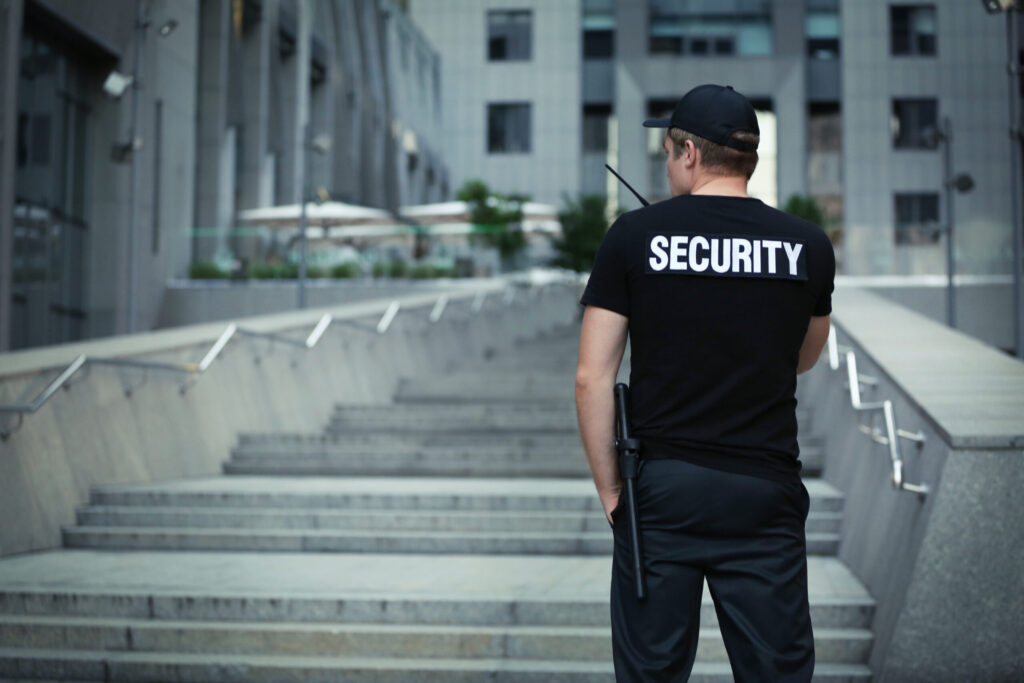This is no small feat of crowd and safety management at venues where emotions go high and stakes are even higher. Doors Supervisor Security Officers ensure guest safety without compromising venue policies. Let’s find out how door supervisors enforce security, crowd management, and crowd management safety in an orderly environment for everyone.
Door Supervisor Security Officers: The Unsung Heroes of Events
They stand and observe at entry points throughout the night, watch behaviour, and enforce the rules, from concerts to nights in nightclubs to corporate security guards. These guards are mere traditional security guards; their training is tailored to higher-volume venues where higher-volume crowds and conflict resolution play critical roles.
1-Management at the Access Points
The main job of a door supervisor security officer is to control precise entrance and exit points. By controlling the exit or entry of any particular object or person into a given venue, one can prevent overcrowding or unnecessary entry of unauthorised people. This is such an important role, though, because without this function, unchecked entry and exit points may result in crowding, posing dangers for everyone involved.
Some door supervisors use tactics to run these points. These techniques include:
Checking IDs: They check identification to ensure that participants are in the suitable age group or have the proper requirements to attend certain events.
Scanning Tickets: This is done through equipment to scan whether each attendant has their entry ticket handy.
Restrict Entry of Troublemakers Guests: Identifying probable hoodlums before they penetrate the entrance.
Such an action will ensure gatekeepers enforce their rules without causing a conflict that compromises a guest’s value and security.
2-Conflict Management and Conflict Resolution
In traffic venues, emotions can quickly erupt, and sometimes, situations become hostile. Door Supervisor Security Officers are trained to recognize and respond to the early warning signals of a potential breakdown compromise before things get out of hand. Using a balance of communication skills and a display of calm can diffuse a situation fairly effectively, reducing the need to use force.
Reading Body Language and Verbal Cues
This may be one of the capacities door staff often have regarding body language, which might be pivotal in pre-holding cases before an occurrence happens. They should apply the proper observation over one’s activities to start when issues brew and offer preventive solutions regarding the crisis early enough; sometimes, you need to stroll and speak briefly with one client or engage them to their level best to dissolve the boiling.
Word-based ways of softening ends:
Door supervisors are also trained in verbal de-escalation, using calm and respectful language to diffuse tensions. For example, if a guest becomes agitated, a door supervisor may do the following:
Acknowledge their concerns: This helps guests feel heard quickly and eases frustrations.
Reinforce venue rules calmly: Explaining rules clearly without a confrontational tone.
Offer options: When possible, suggesting alternative solutions helps de-escalate the situation.
Crowd Control and Flow Management
Crowd density during peak hours is likely to reach its pinnacle when entering right before the event starts, at the intermission, and sometimes even when it’s time to close. This work will primarily lie in the hands of Door Supervisor Security Guards because they are expected to hold responsibility for ensuring guests pass in and out smoothly and without compromise while adhering to the necessary safety mechanisms within the venues.
Aiding and Regulating the Flow
Managing large crowds is more than just holding someone in line. Door controllers often utilise veiled suggestions and physical deterrents to control pedestrian flux, maintain open pathways, and limit bottlenecks as much as possible. Clear access is essential at crisis points when evacuation without harm needs to be accomplished.
3-Coordinating Security Guard Services with Other Available Services
Most big venues use several Security Guard Services, which include general and specialised event security. The door supervisor collaborates with all these groups to monitor and pass information about those of concern or causes of disorder in the location. This strategy ensures that all security personnel behave in concert to handle vast numbers of people effectively.
Politely request the guest leave: Escorting intoxicated individuals out of the venue will decrease the chances of conflicts.
Arrange for safe transportation: The guest should have a secure means to leave the venue.
The door supervisor manages drunken guests, ensures that things do not get out of hand, and ensures that the venue continues to be a safe, enjoyable space for everyone.
Building Rapport with Guests and Staff
Another area that door supervisors must often emphasise is rapport-building with guests and the venue’s staff. Whenever door supervisors appear friendly and professional, mutual respect develops in the environment, making resolving any conflict or implementing any desired policy much more manageable.
1. Creation of a Welcoming First Impression
First-line contact with guests and their demeanour during a visit will set the entire atmosphere. Suppose a guest feels welcomed with a smile and a professional dress and outlook. In that case, they create the impression that the security team will aid the guest’s stay experience rather than disrupt it.
2. Improvement of the Communication between the venue and the staff
Effective communication between door supervisors and other staff at a venue, such as bartenders or event organisers, enables running to be smooth. Being informed about what is expected and what to expect also allows the door supervisor to anticipate potential problems and act appropriately in advance.
Prompt Response to Emergency Situations
It is during emergencies when one’s experience and training come in handy. These include having experience as a door supervisor security guard, where, regardless of whether the problems are medical or require evacuation or even a real fight, a door supervisor will always respond quickly to mitigate injury and put things in line.
Emergency Response: Door supervisors are taught the emergency procedures. They are always aware of how to respond to any situation. This will help them avoid panicking and ensure the safety of the guests, even in highly stressful situations. For instance, in a fire, a door supervisor may:
- Guide the guests through the established evacuation routes.
- Assist those with mobility problems in getting them out safely and quickly.
- Notify emergency services: The first responders get to be well informed.
Deal with Physical Fight
De-escalating a fight is the primary way to deal with fights. Sometimes, however, a fight is bound to happen. Hence, door supervisors are trained to avoid more harm than possible. They may restrict the person only when necessary so that the minimum force is always needed and support from fellow security officers is sought.
Call authorities where necessary: The police will undoubtedly be called about grave situations.
Benefits of Highly Trained Security Guard Door Supervisors
The engagement of a professional Security Guard Service, in addition to well-trained door supervisors, is said to have well-known benefits for areas hosting many guests. The skill in crowd control, conflict handling, and emergency preparedness guarantees the guest that he can enjoy a much safer time while venue employees carry out a smooth business procedure.
1. Better safety for all
With door supervisors on shift, guests can enjoy events without concern for their safety. This feeling of safety puts people in a better mood to relax and enjoy the rest of the events.
2. Venue Safety and Reputation
A secure and well-managed venue will attract more guests and repeat business. When people feel secure, they’re more likely to recommend that venue to others, improving its reputation and attracting more patrons.
3. Compliance with Legal Standards
Most busy venues must meet specific security standards, mainly when serving liquor or reaching a particular capacity. Door Supervisor Security Officers help venues meet these standards, preventing potential legal issues and fines.
Conclusion: The Door Supervisor Security Guard Value
Doorkeepers are invaluable in big entertainment venues. They provide a prominent, visible element of security and management behind the scenes. By controlling crowds and resolving disputes that may create safety issues with guests in a traffic-heavy venue, doormen help establish an environment wherein guests feel safe and valued.
In any venue with high foot traffic, a door supervisor security guard is competent to be more than the gatekeeper; he is an ambassador of safety and professionalism. Maintaining order, preventing conflicts, and stepping in when issues arise, the door supervisor will ensure the guest experience is of the highest quality, preserve the integrity of the venue, and help the venue become successful.


